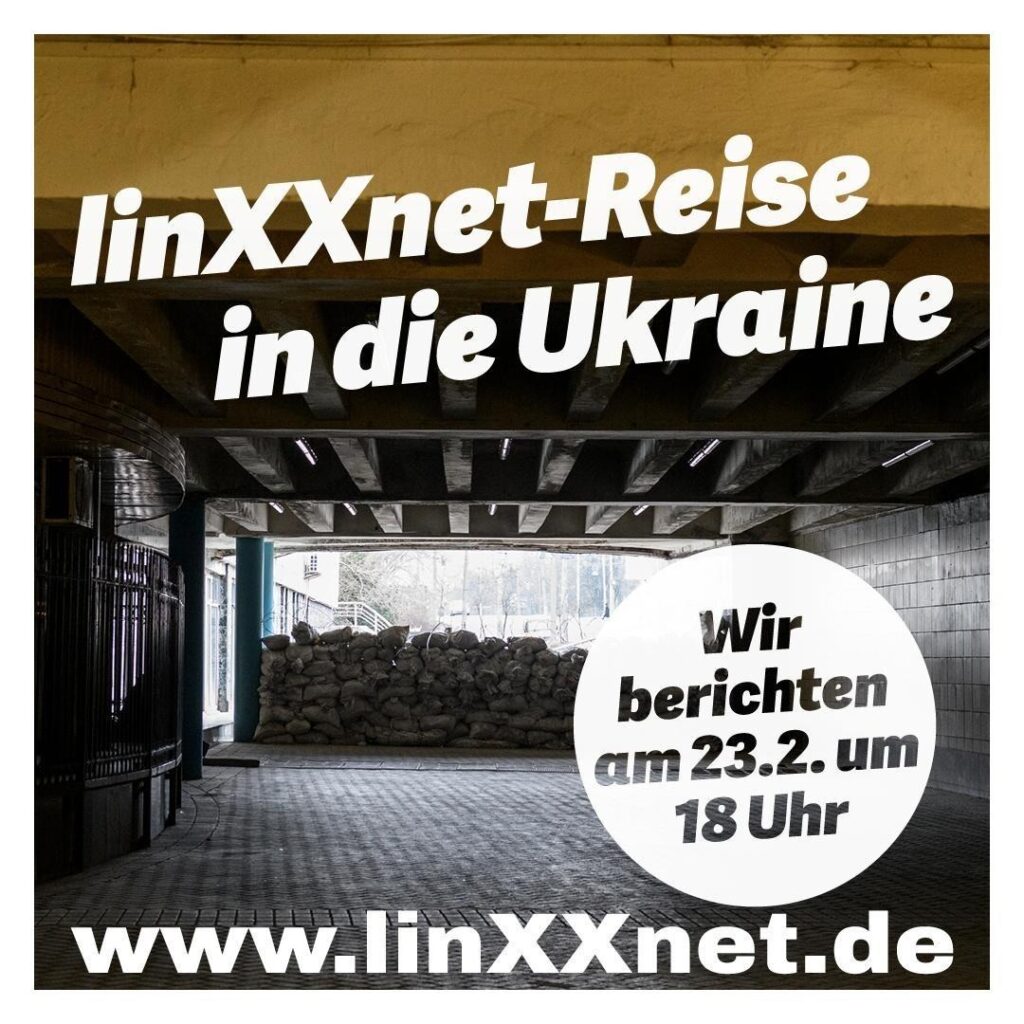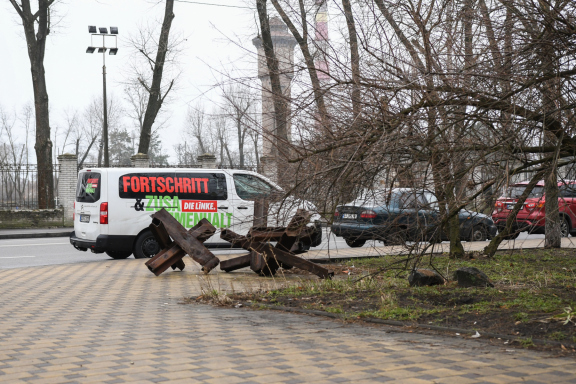Livestream zu “Rethinking Peace – Emancipation against Putin’s Long-Lasting Brutality”
Livestream zu “Rethinking Peace – Emancipation against Putin’s Long-Lasting Brutality” Weiterlesen »
Mitschnitt: auf Youtube

Ende Januar waren Jule Nagel und das linXXnet gemeinsam mit zivilgesellschaftlichen Akteuren wie dem Space Leipzig in Kyiv in der Ukraine. Ihr Ziel war es, dem Ruf ukrainischer Linker zu folgen und ihnen in ihren Perspektiven auf den russischen Angriffskrieg, auf die derzeitige Lage der ukrainischen Gesellschaft, Wirtschaft und politischer Verfasstheit und die in der Europäischen Union und den USA geführten Debatten um Umgang mit Putin und Unterstützung der Ukraine zuzuhören.
Das haben wir gemacht und wollen diese Erkenntnisse gern teilen, und zwar am
23. Februar 2023, 18 Uhr, Big Blue Button.
Merkt euch schon einmal das Datum vor! Spannend wird es in jedem Fall, denn wir haben beispielsweise mit Vertreter:innen von Sozialniy Rukh (Sozialer Bewegung] gesprochen, der mit mehr als 100 Mitgliedern tatsächlich gerade größten linken Organisation in der Ukraine oder mit Gewerkschafter:innen. Der Kampf gegen die russische Armee ist auch ihr Kampf und so gehört für sie zur Solidarität auch die Bewaffnung. Doch geht es auch um mehr, einen Schuldenschnitt für die Ukraine wie die Länder des globalen Südens zum Beispiel. Oder endlich effektive Sanktionen gegen russische Vermögende, auch dann, wenn sie deutsche Vermögen treffen.
Bei dem Centre for Civil Liberties wie in Butscha haben wir uns angehört, wie die Kriegsverbrechen der russischen Armee und der von Putin befohlene Angriffskrieg juristisch aufgearbeitet werden. Ziel: Verfahren am Internationalen Strafgerichtshof in Den Haag plus ein Sondertribunal, um das Verbrechen der Aggression effektiv verfolgen zu können.
Der Eindrücke gesammelt haben wir also viele, nicht zuletzt mit denen, die sich abseits dezidiert politischer Organisationen zusammengefunden haben und praktische Solidarität üben. Den “ukrainischen Kommunismus”, wie es ein Gesprächspartner formulierte.
Wir laden euch herzlich ein, euch dazuzuschalten. In Abstimmung mit unseren Gesprächspartner:innen auf der Reise und dem Büro der Rosa-Luxemburg-Stiftung in Kyiv werden wir dafür sorgen, dass die Perspektiven ukrainischer Linker unmittelbar präsent sein werden.
Reise in die Ukraine – Wir sind zurück und berichte(te)n am 23.02., um 18 Uhr! Weiterlesen »

Wir sind wieder zurück von unserer Reise in die Ukraine. Die Gesprächspartner:innen, die wir angekündigt haben – linke/ emanzipatorische Kreise, Gewerkschaften und die Menschenrechts-Organisationen, die Strafverfahren gegen die russischen Verantwortlichen vorbereiten – haben wir getroffen. Und noch viel mehr Menschen. Kleine Zusammenfassungen unserer Tage in der Kyiv könnt ihr auf den Instagram-Accounts von Jule und vom linXXnet nachlesen:
Was wir im Folgenden noch tun werden:
– Einen ausführlichen Reisebericht für das MItteilungsblatt der LINKEN Leipzig hat Jule direkt auf der Rückfahrt im Auto in die Tasten gehauen. Das erscheint dann mit Bericht Mitte Februar 2023.
– Außerdem veröffentlichen wir drei YouTube-Interviews. Das erste, mit dem Friedensnobelpreisträger Centre for Civil Liberties, ist schon online und haben wir in Kooperation mit der Rosa-Luxemburg-Stiftung Sachsen veröffentlicht: https://www.youtube.com/watch?v=_DmmOHUGFQo&feature=youtu.be
– Weiterhin werden wir Dank der Rosa-Luxemburg-Stiftung Bund zwei weitere Artikel veröffentlichen. Die teilen wir, wenn wir sie geschrieben haben 🙂
– Am 23. Februar 2023 werden wir selber eine digitale Veranstaltung organisieren. Beginn ist 18 Uhr. Dort werden wir gemeinsam mit einigen unserer Gesprächspartner:innen über unsere Reise berichten, Schlussfolgerungen ziehen und mit euch ins Gespräch kommen.
Wir haben versprochen, transparent zu machen, wohin eure Spendengelder geflossen sind. Hier eine Übersicht:
Vielen Dank nochmal an dieser Stelle an euch!
Ein Veranstaltungstipp noch zum Schluss. Am 24. Februar 2023 – ein Jahr nach Beginn der russischen Invasion – findet in Berlin ein Panel der Rosa-Luxemburg-Stiftung Bund statt. Die Veranstaltung wird auch per Livestream übertragen, Beginn ist 19 bis 21.30 Uhr. Wir hoffen sehr, dort uns bekannte Gesprächspartner:innen wiederzusehen! Alle Infos hier: https://www.rosalux.de/veranstaltung/es_detail/AF51M/solidaritaet-in-zeiten-des-krieges?cHash=51f400858748cd2451819568e320cf64
Wir halten euch auf dem Laufenden!
Reise in die Ukraine Weiterlesen »
Nach dem Angriff Russlands auf die Ukraine am 24. Februar dieses Jahres waren Aufmerksamkeit, Betroffenheit und Hilfsbereitschaft hierzulande groß. Langsam droht der grausame Krieg allerdings zur Normalität zu werden. Doch das Gegenteil ist notwendig: Den Menschen in der Ukraine steht ein krasser Winter bevor. Aktuell bedeuten die russischen Angriffe auf die Energieinfrastruktur, dass auch die Wasserversorgung und das Kommunikationsnetz zusammenbrechen. „Bei den harten Wintern im Osten der Ukraine wäre mit vielen Toten zu rechnen. Das zerstört die Existenzbedingungen der Zivilbevölkerung, es gefährdet ältere, ärmere und wenig mobile Menschen, die keine Ressourcen haben, um zu fliehen. Das ist ein Verbrechen gegen die Menschlichkeit. Eine extrem dramatische Situation.“ konstatiert Tim Bohse ein Leipziger Osteuropaexperte, der im Dezember von einer Monitoringreise aus der Ukraine zurückkehrte.
Bei der Reise ermittelte er mit seinen Mitstreiter*innen die Bedarfe der Menschen, welche unmittelbar von den Folgen des russischen Angriffskrieges betroffen sind. Gerade bei der Koordination von staatlichen Hilfsleitungen an die Ukraine hat die Monitoringgruppe Mängel ausgemacht. „Kleine Hilfsorganisationen, Bürgermeister und einzelne ukrainische Freiwillige“ agieren „wesentlich flexibler und effektiver“. Das Plädoyer ist klar: „Es geht darum die Aufmerksamkeit für die Entwicklung in der Ukraine aufrecht zu erhalten. Wir wünschen uns einen „Winter der Solidarität“ mit der Ukraine in der Hoffnung, dass unsere Zusammenarbeit und Unterstützung im Frühjahr vielleicht besser aufgestellt ist, als das jetzt der Fall ist.“
*Eine Initiative von Einzelpersonen und Initiativen aus Leipzig unterstützt einen Aufruf zu Spenden für humanitäre Belange. Diese sollen im Januar 2023 im Rahmen einer Reise nach Lwiw und Kyiv direkt an Initiativen und Organisationen übergeben werden. Zu den Unterstützenden gehören die ukrainische NGO VOSTOK SOS, das ukrainisch-deutsche Künstler*innenkollektiv Óstov, der Space Leipzig, der Freundeskreis der Ukraine in Leipzig e.V.i.G., der Leipziger Osteuropawissenschaftler Tim Bohse, die Bürgerrechtlerin Gesine Oltmans und der Pfarrer der Peterskirche Andreas Dohrn.*
Der Aufruf ist eine Initiative des linXXnet, das ab März 2022 in Leipzig eine Unterbringungsbörse für Geflüchtete aus der Ukraine initiiert und betrieben hatte.
Die Beteiligten erklären:
“Die Lage der Menschen in der Ukraine darf nicht aus dem Blick geraten. Es braucht gezielte humanitäre und auch moralische Unterstützung für die unter dem Krieg leidenden Menschen, es braucht Unterstützung des Widerstandes gegen den russischen Angriffskrieg, es braucht Unterstützung für die Strukturen der Selbstorganisation. Ohne all das wäre die Ukraine den Angriffen Russlands unterlegen.
Es gibt einzelne EU-Staaten, wie beispielsweise die baltischen Staaten oder Polen, bei denen mehr Empathie mit der ukrainischen Gesellschaft wahrnehmbar ist, als in Deutschland. In Anbetracht der abgründigen Form der Kriegsführung von Russland ist eine stärkere Unterstützung unabdingbar.
Das Ende des Krieges bleibt für uns die oberste Prämisse, doch ein Frieden kann nicht zu Putins Bedingungen hergestellt werden. Wir nehmen den Aufruf für einen Winter der Solidarität an und rufen zu Spenden auf.”
Wir bitten um Geldspenden, Powerbanks und gerne eigene Aktionen zum „Winter der Solidarität“. Die gesammelten Spenden bringen wir selbst nach Lwiw und Kyiv. Dort treffen wir Freiwilligenorganisationen, Akteur*innen der Zivilgesellschaft und emanzipatorischer Bewegungen. Wir wollen ihnen die Aufmerksamkeit verschaffen, die es jetzt braucht.
* Powerbanks können im linXXnet (Brandstraße 15, 04277 Leipzig) und im Interim (Demmeringstraße 32, 04177 Leipzig) abgegeben werden.*
* Geldspenden sammeln wir via:*
*- Gofundme (https://www.gofundme.com/f/ukraine-winter-der-solidaritat), *
*- Paypal (juliane.nagel@linxxnet.de/ Betreff: Ukraine) *
Das Interview mit Tim Bohse: https://kreuzer-leipzig.de/2022/12/15/das-ist-ein-verbrechen-gegen-die-menschlichkeit